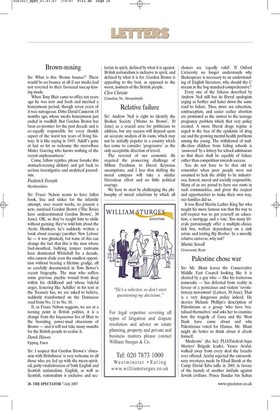Relative failure
Sir: Andrew Neil is right to identify the Broken Society (Memo to Brown', 30 June) as a crucial area for politicians to address, but any success will depend upon an accurate analysis of its roots, which may not be initially popular in a country which has come to consider 'progressive' as the only acceptable direction of travel.
The reversal of our economic ills required the pioneering challenge of Milton Freidman to liberal Keynsian assumptions, and I fear that shifting the moral compass will take a similar Herculean effort and no little political courage.
We have to start by challenging the philosophy of moral relativism by which all choices are 'equally valid'. If Oxford University no longer understands why Shakespeare is necessary to an understanding of English literature, why should the C stream in the bog-standard comprehensive?
Every one of the failures described by Andrew Neil still has its liberal apologists urging us further and faster down the same road to failure. Thus, more sex education, contraception, and easier earlier abortion are promoted as the answer to the teenage pregnancy problem which that very policy created. A more liberal drugs regime is urged in the face of the epidemic of drug use and the growing mental health problems among the young. The withdrawal of middle-class children from failing schools is 'answered' by a lottery for school admissions so that there shall be equality of failure rather than competition towards success.
You do not have to be that old to remember when poor people were not assumed to lack the ability to be industrious, honest, moral and socially responsible. Many of us are proud to have our roots in such communities, and given the respect and opportunities to make their own way, our families did so.
It was Revd Martin Luther King Snr who taught his more famous son that the way to self-respect was to get yourself an education, a mortgage and a vote. Too many liberals patronisingly offer a multiple-choice tick box, welfare dependency on a sink estate and texting Big Brother. In a morally relative universe, why not?
Martin Sewell Gravesend, Kent



















































 Previous page
Previous page